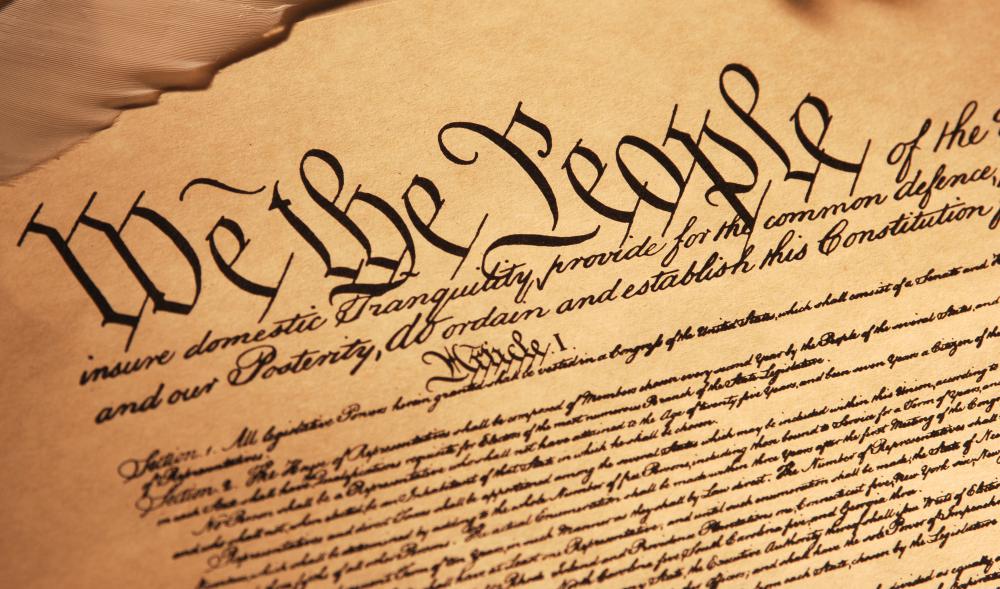At WiseGEEK, we're committed to delivering accurate, trustworthy information. Our expert-authored content is rigorously fact-checked and sourced from credible authorities. Discover how we uphold the highest standards in providing you with reliable knowledge.
How Fast is a Speedy Trial?
The speedy trial, a right guaranteed in the United States under the Sixth Amendment to the Constitution, can actually vary considerably in length. This right is generally focused on forcing courts to prosecute cases in a timely fashion, with no actual limits being placed on the length of the trial once it has begun; the goal is to avoid keeping people in jail awaiting trial for indefinite periods of time, not to truncate trials. A number of factors can influence how long it takes for a case to go to trial and even in areas where there are statutes requiring prosecution by a certain date, there can be special circumstances which lead to delays.
A number of important rights for people accused of crimes can be found in the Sixth Amendment, which reads: "In all criminal prosecutions, the accused shall enjoy the right to a speedy and public trial, by an impartial jury of the State and district wherein the crime shall have been committed, which district shall have been previously ascertained by law, and to be informed of the nature and cause of the accusation; to be confronted with the witnesses against him; to have compulsory process for obtaining witnesses in his favor, and to have the Assistance of Counsel for his defense."

When the Constitution was drafted, there were concerns about the rights of accused individuals. This Amendment, among other things, entitles people to legal counsel, the opportunity to know the charges against them, the right to a jury, and the chance to cross examine witnesses. The speedy trial clause was designed to address concerns that people could be accused of a crime and held in jail indefinitely, which in addition to causing emotional hardship could also lead to problems with administering businesses and result in negative public perception. When someone is held in jail for a year awaiting trial, for example, it can start to seem like that person has already been convicted.

In some states, the speedy trial clause has been addressed with statutes which require that a case go to trial within a set period of time, such as six months. If the case cannot be brought to trial, the charges are dropped. Murder is usually an automatic exception to the speedy trial rule, recognizing that it can take time to gather the material to prosecute a murder. In other states, courts determine the length of a speedy trial, and rule on individual situations when asked to do so. If good reason can be shown for a delay, the trial will be put off.

While the speedy trial is often described as something which protects the defendant, defendants actually can benefit from having a long lag time before trial. Sometimes the speedy trial clause must be invoked against a defendant who attempts to delay a trial longer than a court thinks is reasonable.
AS FEATURED ON:
AS FEATURED ON:













Discussion Comments
This article mentions that some states have laws that require the release of some defendants if they are not given a speedy trial in a set period of time. This definitely sounds like a broken system to me. How is this fair to victims? First the victim is a victim of the person committing the crime and then a victim of the court system.
I don't know how long the average person spends in jail before a trial, but in most cases people are able to be bailed out, so they are not actually in jail while they are waiting for their trials to begin anyway.
It's unfortunate for many accused people that the Sixth Amendment to The United States Constitution doesn't put an exact time period on what a speedy trial is and what happens when a person doesn't get a speedy trial. I was surprised to learn how many people actually spend years in jail while waiting for a trial.
There is something wrong with a system where I have to spend a year locked behind bars before I can get a chance to prove I am innocent. This goes against the phrase used by the U.S. legal system, "Innocent until proven guilty." Innocent people shouldn't be locked up in jail.
Even if you are found not guilty when you go to trial it is like you were guilty of something because you spent all those months in jail.
Post your comments